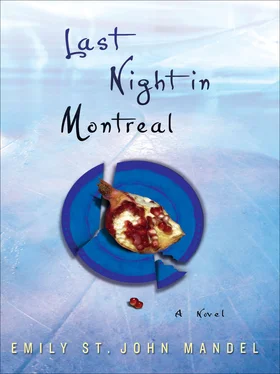The majority of languages, he told her grandly, will disappear. Since she still seemed somewhat interested, Eli flashed his favorite statistics across the table like a Rolex: of the six thousand languages currently spoken on this earth, 90 percent are endangered and half will be gone by the end of the next century. An optimistic few hope to save a handful of them; most hope for nothing more than a chance to document a fraction of the loss. His work was part reconstruction, part thesis, part requiem, he told her. She listened quietly, apparently rapt, and asked intelligent questions just when he thought her interest couldn’t possibly be sincere. She said lightly that she was used to much more localized vanishing acts: individual people, motel rooms, cars. She wasn’t used to disappearance on a larger scale. Imagine, he said, losing half the words on Earth. Although what he was actually trying to imagine just then, as he said that, was what it might be like to kiss her neck. She nodded and watched him across the tabletop.
Three thousand languages, destined to vanish. He’d become obsessed with the untranslatable: his idea, and the subject of his thesis (or what had been a thesis, some years earlier, before it suddenly imploded and went unfinishable on him overnight), was that every language on earth contains at least one crucial concept that cannot be translated. Not just a word but an idea, like the French déjà vu: perfect and crystalline in its native language, otherwise explainable only by entire clumsy foreign paragraphs or not at all. In Yup’ik, a language spoken by the Inuit along the Bering Sea, there is Ellam Yua: a kind of spiritual debt to the natural world, or a way of moving through that world with some measure of generosity, of grace, or a way of living that acknowledges the soul of another human being, or the soul of a rock or of a piece of driftwood; sometimes translated as soul, or as God, but meaning neither. In a Mayan language, K’iche, there is the Nawal: one’s spiritual essence but separate from the self; one’s other, not exactly an alter ego or merely an avatar but a protective spirit that cannot be summoned.
And if you accept this, he told her, this premise that every language holds something that exists in no other tongue, an entity far outweighing the sum of its words, then the loss takes on a staggering weight. It isn’t so much a question of losing three thousand words for everything. There aren’t three thousand words for everything; the speakers of Yup’ik have no reason to describe tigers in the high arctic; the speakers of the jungle languages need no language for the northern lights. It isn’t even so much about the words. His belief, the premise of the thesis, was that these are not just languages we lose in the gloaming, not just three thousand sets of every word, but three thousand ways of existing on this earth.
“I’m sorry,” he said finally. “I didn’t mean to get so pedantic about it.”
“It’s all right. It’s interesting,” she said.
She had been listening for a very long time. They’d met early in the afternoon, and it was almost evening now. It had been weeks since he’d first noticed her here, sitting quietly in the Café Matisse when he walked by the window or came in for a coffee. She came here often, and when they were here at the same time he liked to try to sit as nearby as possible. On this particular day, when he’d left Thomas and Geneviève at the Third Cup Café across the intersection, there were no empty tables when he’d wandered in— thank you, God — and in a catastrophe of blind courage he’d walked across to her table, insinuated himself into the opposite seat, and introduced himself. By some small miracle she’d smiled back and said her name instead of telling him to leave her alone and wait for his own goddamn table, and that had been six or seven hours ago. The café was quiet now, and the morning waitress had left for the day. The afternoon waitress was leaning on the countertop, staring out at the uneventful street.
“But what about you?” he asked. “You know I like dead languages, but what do you like?”
“Live languages,” Lilia said. “Reading, taking photographs, a few other things. Do you work in the neighborhood?”
“Yeah, a few blocks from here. I stand in an art gallery staring at the wall four days a week. You?”
“The wall? Not the paintings?”
“There aren’t that many paintings there — actually, there aren’t any— I don’t want to talk about my job,” he said. “I don’t like my job very much, to be perfectly honest. What do you do for a living?”
“I wash dishes. Do you like to travel? I went to New Mexico recently; have you been?”
“Several times. And what’s interesting,” he said, “is that we’ve been talking for hours now, and I hardly know anything about you. Where are you from?”
She smiled. “This will sound very strange to you,” she said, “but I’ve lived in so many places that I’m not entirely sure.”
“I see. Well. How long have you lived in New York?”
“About six weeks,” she said.
“And where were you just before that?”
“You mean where was I living when I boarded a train to New York?”
“Exactly. Yes. You arrived here from somewhere.”
“From Chicago,” she said.
He felt that he was finally getting somewhere. “You lived there for a while?”
“Not really. A few months.”
“Before that?”
“St. Louis.”
“Before that?”
“Minneapolis. St. Paul. Indianapolis. Denver. Some other places in the Midwest, New Orleans, Savannah, Miami. A few cities in California. Portland.”
“Is there anywhere you haven’t lived?”
“Sometimes I think there isn’t.”
“You’re a traveler.”
“Yes. I try to be as up-front about it as possible now,” she said.
He wasn’t sure what she meant but let it pass. “You said you liked live languages,” he said.
“I like translating things.”
“What do you translate?”
“Random things that I come across. Newspaper articles. Books. It’s just something I like doing.”
Four and a half languages not including English, she said, when pressed for more details. Español, Italiano, Deutsch, Français. Her Russian, she admitted, was shaky at best. Her wrist was warm beneath his fingertips.
“I envy you. I don’t speak any living languages except English. What else do you like?”
“I like Greek mythology,” she said. “I like that Matisse print over the bar. It’s the reason why I come here, actually.” She gestured at the opposite wall, and he twisted around to look. The Flight of Icarus, 1947: one of Matisse’s final works, from the time when he’d subsided from paint into paper cutouts and was moving closer and closer to the end of the line, unable to walk, his body slipping away from him. Icarus is a black silhouette falling through blue, his arms still outstretched with the memory of wings, bright starbursts exploding yellow around him in the deep blue air. He’s wingless, and already close above the surface of the water: Matisse would be dead in seven years. Icarus, plummeting fast into the Aegean Sea, and there’s a red spot on him, a symbol, to mark the last few heartbeats held in his chest.
“I like mythology too. When did you get interested in Greek legends?”
“Two days after I turned sixteen.”
“That’s very specific. You got a book for your birthday?”
“No, someone I knew was talking about the story, so I read it as soon as I could. I don’t really know Matisse, but I like that print. I like the story,” she said. “I think it’s the saddest of all the Greek legends.” She blinked; her voice seemed suddenly tired. “What time is it?”
Читать дальше












